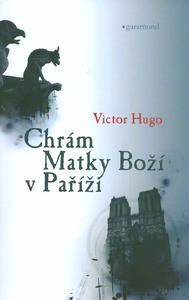Take a photo of a barcode or cover
En el fondo, muy en el fondo, este libro es una divertida comedia de enredos sobre la friendzone.
Y Febo es un cabrón con ruedas.
Y Febo es un cabrón con ruedas.
Really more of a four and a half, to be honest.
Review to follow.
Review to follow.
In case you were wondering, this is definitely not like the Disney film. I mean, obviously since Disney has to make a movie have a happy ending and this book’s is far from that.
This book was my classic pick for the month of February. I remember picking it up once but only got through 10% because of the slow beginning. This time I borrowed the audio book from my library otherwise I probably wouldn’t have got through it. The first 35% or so is pretty slow and many of the key characters don’t come into play until then.
One big difference from book to film is the characters. Quesimodo doesn’t actually have many scenes in the book. Although his ending is much happier than Esmeralda and Frollo. Esmeralda was very annoying and only cared about her dear Phebis who was kind of a dillweed. She does have her goat but other than that she is not the strong indepedent woman that Disney portrays her as. Her ending is also quite tragic. Frollo is still horny guy who only has eyes for Esmeralda. He wants her and he doesn’t want anyone else to have her. I would say that Disney made him more of a villain and really his only sees are lusting over someone.
Overall, it was a decent classic. I’m glad I listened to it as an audio book. I wouldn’t really say there is any exciting plot twists but I’d recommend this one if you like the movie and want to see what actually happened.
This book was my classic pick for the month of February. I remember picking it up once but only got through 10% because of the slow beginning. This time I borrowed the audio book from my library otherwise I probably wouldn’t have got through it. The first 35% or so is pretty slow and many of the key characters don’t come into play until then.
One big difference from book to film is the characters. Quesimodo doesn’t actually have many scenes in the book. Although his ending is much happier than Esmeralda and Frollo. Esmeralda was very annoying and only cared about her dear Phebis who was kind of a dillweed. She does have her goat but other than that she is not the strong indepedent woman that Disney portrays her as. Her ending is also quite tragic. Frollo is still horny guy who only has eyes for Esmeralda. He wants her and he doesn’t want anyone else to have her. I would say that Disney made him more of a villain and really his only sees are lusting over someone.
Overall, it was a decent classic. I’m glad I listened to it as an audio book. I wouldn’t really say there is any exciting plot twists but I’d recommend this one if you like the movie and want to see what actually happened.
I've already read Les Miserables, so I had pretty high expectations for Hugo's other famous book. All I can say is it takes a while to get into, but The Hunchback meets those expectations. It has loveable characters -- Quasimodo, La Esmeralda, even Claude Frollo -- and it set against the beautiful backdrop of medieval Paris. It even has many chapters of Hugo's extensive rants about French culture (oh joy!), though few in comparison to Les Miz. The writing of this story is beautiful, and it follows the paths of many different characters such as those mentioned before, as well as the jerk Phoebus, the poet Pierre Gringoire, the student Jehan Frollo, and the recluse who is seeking her missing daughter of fifteen years. The book is called The Hunchback of Notre Dame, but it should really be called Those Who Love the Gypsy Girl -- because what really ties the story and characters together is the teenage (yes, believe it or not, Disney fans, Esmeralda is only 16) Gypsy dancer La Esmeralda, who catches the eye of not one, not two, but three (and even four, if you count Gringoire) male characters. It is the fight for this girl that sparks the ultimate conflict of the story, and ultimately is the cause of all the characters' (except Phoebus, but nobody liked him anyway) downfall. I give this a 5/5 (as bad as it seems at first, the ending makes it all worthwhile) and I would recommend it to serious readers who enjoy more descriptive stories, because if you're into quick, action books, you won't make it past the first chapter.
Get ready for some heavy reading ;)
Notre Dame de Paris is a story set in 15th Century and follows the paths of Claude Frollo, Quasimodo, Jehan Frollo, Esmeralda and Gringoire.
It's a story about love, lust, trust and finding yourself.
But no, it's not a romance. It's not a happy story. There are glimpses of happy moments, but the surroundings say those moments won't last.
It's not about Quasimodo either (like the Disney movie makes one believe). It's about the effects Esmeralda has on her surroundings, without even noticing half of it. She's a young woman (16 yrs old) looking for her parents. But she falls in love with Phoebus after the lustful Claude Frollo attempts to kidnap her (with the help of Quasimodo). And with that simple young love, she sealed her fate.
Frollo cannot accept seeing Esmeralda in the arms of another man (whether it is seeing her longing for Phoebus or finding out she married Gringoire - to save him ) and so he devises a scheme that will put her life on the line with her only way out being him - Frollo.
In all honesty, the first 150 pages are a bit hard to read. Hugo "wastes" a lot of time and words with long descriptions that make one skim certain paragraphs. But when the plot thickens, things win a new speed and the book becomes a lot easier to read.
Generally speaking, it's a good book, even if it's rather depressing.
Worth reading ;)
Notre Dame de Paris is a story set in 15th Century and follows the paths of Claude Frollo, Quasimodo, Jehan Frollo, Esmeralda and Gringoire.
It's a story about love, lust, trust and finding yourself.
But no, it's not a romance. It's not a happy story. There are glimpses of happy moments, but the surroundings say those moments won't last.
It's not about Quasimodo either (like the Disney movie makes one believe). It's about the effects Esmeralda has on her surroundings, without even noticing half of it. She's a young woman (16 yrs old) looking for her parents. But she falls in love with Phoebus after the lustful Claude Frollo attempts to kidnap her (with the help of Quasimodo). And with that simple young love, she sealed her fate.
Frollo cannot accept seeing Esmeralda in the arms of another man (
In all honesty, the first 150 pages are a bit hard to read. Hugo "wastes" a lot of time and words with long descriptions that make one skim certain paragraphs. But when the plot thickens, things win a new speed and the book becomes a lot easier to read.
Generally speaking, it's a good book, even if it's rather depressing.
Worth reading ;)
I found the story to be a bit less exciting than I expected but Hugo is a wonderful storyteller. The tongue-in-cheek and humorous asides were definitely my favorite! Plus, Hugo has such a great way of treating the characters in his narration - not in terms of plot or by making the characters themselves great but by the narrator's detailed, analytical and sometimes even mocking comments on them. I'd read a biography written by Hugo anytime!
It was a little tough at times, mostly because Hugo can get wordy, but it's so, so worth sticking through to the end.
There's a pretty good book buried under all the history lessons and discussions about architecture, but those sections are a real slog. Could be cut in half for a "don't care about the history lesson" edition.
Right after i bought this book, I started to regret it. I thought that I made a mistake, that I wasted my money on a boring long novel. Well, I needed to read just a few chapters to change my mind.
This novel definitely surprised me, in a good way. I expected a slow, uneventful and incredibly depressive story, and I was very impressed to discover that this book had some very funny moments. I liked the characters, and the plot was entertaining enough. Maybe I wouldn't have minded less pages where the author ranted about architecture and less quotes in latin, but at the end I really enjoyed this novel.
This novel definitely surprised me, in a good way. I expected a slow, uneventful and incredibly depressive story, and I was very impressed to discover that this book had some very funny moments. I liked the characters, and the plot was entertaining enough. Maybe I wouldn't have minded less pages where the author ranted about architecture and less quotes in latin, but at the end I really enjoyed this novel.
Loved every single page of this book. Descriptions of Paris were incredibly well-written, as well as all those historical facts and Hugo's commentary on how Paris has changed over the centuries, I ended up having a panoramic view of the XV century Paris in my head. I had no idea how the book was going to end (guess who reeeally liked to study at school) so everything was a surprise.
I laughed, I was scared, I was intrigued and I fell in love with Victor Hugo's writing style. And now I can't wait to start reading my copy of "Les Misérables".
I laughed, I was scared, I was intrigued and I fell in love with Victor Hugo's writing style. And now I can't wait to start reading my copy of "Les Misérables".






